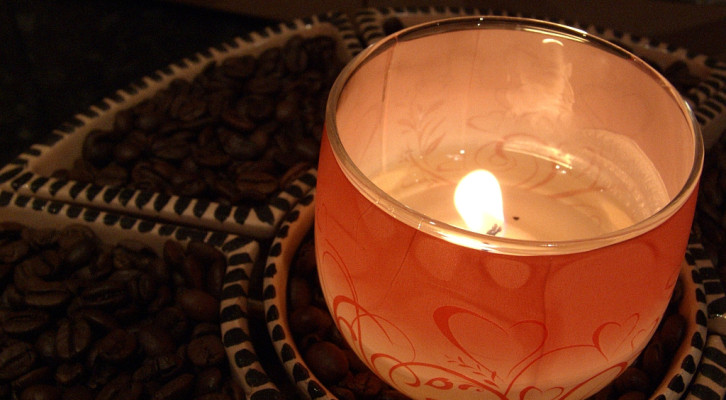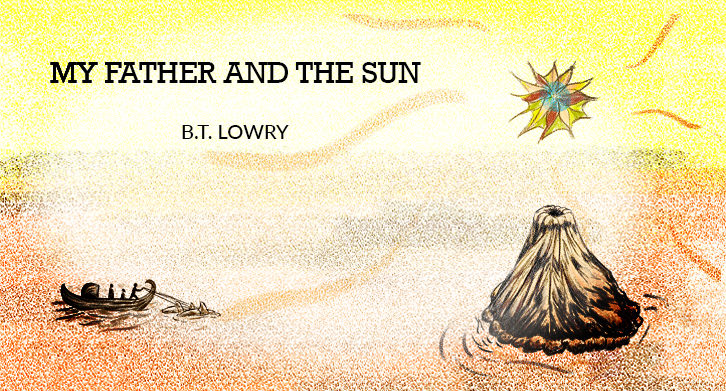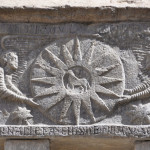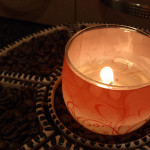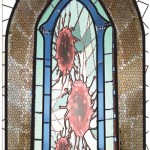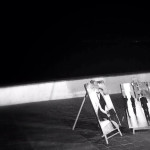Later that night, in the apartment behind the tea house, Yusen would quarrel with his wife about the dreams about their meaning and their source, and about how Yusen came to throw away three weeks’ profit for them. Yusen’s wife would speak hatefully and despairingly of the distant world of Varenn and its many hills of dragons. Hearing her speak, Yusen would be filled with hate and despair also, and for the first time he would raise his hand to her.
Later still, Yusen and his wife would be of one mind again.
– – –
The stranger’s face appeared in the glass door just as Yusen was locking up for the night. The face was a canvas of pale skin pulled tightly over sharp bones, and the eyes were wide open and rimmed with dark circles. Yusen pointed to the sign that read “Closed” in red letters. The stranger’s large knuckles reached forward, rapped quickly on the glass. The wide mouth opened, its thin, red lips slowly, deliberately forming the words, “Open up. Let me in, please.”
Yusen shook his head. He spoke loudly and slowly, through the glass, shaping his words carefully with his own lips. “The tea house is closed,” he said. “Come back tomorrow. We open at ten.”
The man rapped again, more urgently. “Let me in,” he said through the glass. “I have something to show you.” He lifted up the leather case which he’d been carrying under his arm, and held it for a moment before Yusen’s eyes before slipping it back under his arm. “You want to see this,” said the man, patting the case.
Yusen smiled, pleased to have discovered the solution to this mystery. The man was a traveling salesman, probably looking to sell exotic teas and spices. Salesmen had come to Yusen’s door before, and Yusen always turned them away. He had his own suppliers, whom he trusted and who respected him, and he was certainly not interested in buying from shifty characters who appeared out of nowhere, out of the dark of night, and after closing time.
Yusen laughed, and shook his head again. “No salesmen,” he said. “I don’t need any tea today.”
“Not tea,” said the man with his red lips. “Goods from Varenn. Very rare.”
Yusen raised his eyebrows at his. “Oh? No tea?”
The stranger patted the case again. “Open the door,” he said. “I will show you.”
Yusen mastered his curiosity, and shook his head. “Come back tomorrow. You can show me then.” And he began to draw the blinds that would divide him from the night and the stranger outside his door.
“Wait,” said the salesman, rushing to open his leather case and hold it up to the glass where Yusen could see its contents. Yusen’s eyes were caught suddenly in a dazzling flourish of light, and could not help but look. In the velvet interior of the case lay an engraved wand of silver which held at either end a polished red stone. For a moment, Yusen’s breath caught in his throat.
The salesman smiled. “Dreamstones,” he said. “From Varenn. Good price.”
Yusen knew about illegal merchandise, and counterfeit items, and the deceitfulness of salesmen. He stood now inside his brightly lit tea house, looking through the glass door at the stones which shone in the darkness outside, and he scratched his beard for many long seconds, while his longing for beauty and his love of the world called Varenn battled against his skepticism and his strong dislike of the salesman. At last, he turned the key and opened the door. “Come in,” he said to the salesman.
The stranger entered Yusen’s tea house with long, rapid strides, and Yusen closed the blinds behind him. The stranger bowed hastily, awkwardly, in the direction of Yusen’s ancestors. Then he removed his shoes, and following Yusen’s invitation, he sat facing the tea house owner on one of the many colorfully woven carpets that covered the floor. The salesman set the leather case on the carpet in front of him, and removed the wand, which reflected the colors and light of the tea house in a bright swirl. He lifted the wand, held it for a moment in the space between his eyes and Yusen’s, then waved it slowly in the air.
Yusen saw that the wand appeared even more beautiful and more wonderful here, in the light of the teahouse, than it had in the darkness outside the door. He saw now that the engravings depicted two identical dragons with tails coiled together; at opposite ends of the wand, each dragon held in its mouth one of the two bright stones. “Dreamstones,” said the salesman again. “From Varenn. They carry the dreams of their homeworld.”
Yusen reached forward, touched the wand. “And you say the stones are from Varenn?”
The salesman smiled with his wide mouth. “Yes. You are interested in Varenn? You wish to go there someday?”
Yusen looked in the stranger’s eyes. “How did you know?”
The salesman shrugged his bony shoulders, and smiled again. “I guessed. It is my vocation, to guess what things people might love.”
Yusen touched his fingers, gingerly, to the red stones. “These carry… dreams?”
“Of course, yes. These are dreamstones. Would you like to try?”
Yusen raised one eyebrow. “Try?”
“To dream, yes.” After a pause, the stranger said, “I assure you, there is no danger.” And with a reassuring nod, he offered the wand to Yusen.
Yusen took it, felt its coldness and weight it in his hand, waved it cautiously in the air. “Nice, but what does it do?” he asked finally.
“Like this,” said the salesman. He leaned forward and wrapped his large hands around Yusen’s. Then he guided the wand in Yusen’s hands until one of the red stones was touching Yusen’s forehead. “Like this,” he said again.
Yusen stood in a field of tall grass. The golden sky was a fiery tent curving over him, supported all around by the high peaks of distant mountains. A few clouds, colored like summer roses, like peaches and tangerines, lay in low, unmoving bands near the horizon, and clustered on the mountainsides. The air here was warm and thick, but Yusen had no name in his vocabulary for the season. To the south, the great, slowmoving wheel of the white sun rolled across the sky, over the low, lazy clouds and the blood-red tops of the mountains. Yusen lifted his hands to shield his eyes. And there, in the pearly haze, he saw dark objects darting and swooping and chasing one another among the pink clouds and the jagged mountaintops.
“I saw the white sun of Varenn,” he said, absently handing the wand to the salesman. “And the skies where dragons fly.”
“Yes,” said the salesman, as he replaced the wand in its case and closed the lid. “The price for the stones is one thousand rupels. You must agree, it is very good price for such extraordinary goods.”
“And I saw the red mountains,” said Yusen. “How is it possible?”
“It is merely seeing with your third eye,” said the salesman, indicating Yusen’s forehead.
In the end, Yusen paid a thousand ruples for the stones, which was the value of three weeks’ profit from his tea house. And when the stranger left, Yusen took his wand from its case, and touched a dreamstone to his third eye.
The building was cub-eshaped, unadorned, and without windows. Its smooth metallic walls rose tall and straight out of the rocky red dirt. Over the door, which was made of the same featureless material as the rest of the building, a sign glowed in pink and red characters, marking this building as Yusen’s, and a place of civilization in the wide, lonesome wilderness.
The men who gathered within were as beautiful and fierce as the ancestors. Yusen wore a robe of fine silk, and served tea in the manner of the ancestors, while the men in his windowless tea house composed poems in celebration of the hunt, of the dragons, of themselves. These men, and Yusen among them, were the gods of a new world.
Later that night, Yusen brought the wand with its dreamstones to his wife, who spent her days looking after her two small sons in the apartment behind the tea house, and he compelled her to dream. Liso obeyed, but sorrowfully, because she believed such things to be the tricks of demons. Afterwards, Yusen demanded to hear about her dream.
Liso turned, walked away from her husband’s probing eyes. “Exactly what do you want to know?” she asked.
Yusen followed behind her, pleading with his palms open. “Just what you saw. The house with shining walls? The pink sign with my name?”
“Those very things, Yusen,” she said hopelessly, without turning around.
“And you saw me in your dream? How did I look to you?”
Liso became angry, and spun around to face her husband. “What do you want to know? That you’ll be happy there, and prosperous? That I’ve seen it, too? What I saw was a streak of fire in the sky. And do you know what else I saw, in the eyes of our children? Fear is what I saw, fear and dismay.”
“Don’t talk nonsense to me,” Yusen told her. “There will be nothing to fear. Our walls will be strong, and we will live free on Varenn, as the ancestors lived long ago.”
Liso laughed sarcastically. “You dream big, my husband, and you fancy yourself highly. But do you know what? Your dreams are only dust. That godforsaken world with its sky too bright to look at, the red dirt you find so poetic, the foul beasts you prize. All your dreams! They will fail you, and all that will remain will be dust.”
“Shut your mouth!” Yusen yelled at her. “I have sacrificed a lot for this.”
“Too much! And by taking it from your family. This, for instance,” she said, and she threw the wand down, sent it spinning across the floor. “The thousand ruples will come from your children, and from me. We will pay the price in food and heat and medicine and shoes. We will have less. But your own big plans will not suffer the ruples you have hidden away, the ruples that will pay for your great journey, their amount will not be lessened.”
Yusen picked the wand up from the floor, examined it, and put it carefully back in its case. But before he did this, he hit his wife. Then he took the wand in its case back to his tea house, and left Liso crying in her room.
– – –
In the days that followed, Yusen offered the dreamstones to the guests who visited his tea house, and after each man dreamed, Yusen asked to hear the story of that dream.
From every man who dreamed with the stones, Yusen heard a different story of Varenn. Some men saw the white sun; others saw the night sky, deep violet in color, without moon or stars to mark the quarters. Some dreamed of hunters riding over the red hills with bows ready, or on foot, with poisontipped spears, stalking dragons in their mountain caves. Some saw fields of high grass, others the calm, deep seas, and still others the jagged peaks of red mountains.
Some men saw themselves there, and their friends also, in towns where the walls of every building were strong and safe and fireproof; others saw not even themselves, only the empty wilderness. Some heard the screech of dragons and the beating of their wings in the bright, hazy sky; others heard the songs and poems of men at night.
There were great debates among Yusen’s guests about the stones. They wondered whether the dreams revealed past, present or future, and precisely how the stones transmitted the dreams of distant Varenn to men still living on earth, and just how the salesman might have come to possess them in the first place.
Then, too, some stories did not match, or were contradictory, and this caused more debate. One man told of dry wells; another of rainstorms and floods. One man spoke of prosperity and uninterrupted peace; another of a war among different nations of men that would last a hundred years. One said men would come to rule the world of dragons, and another said the dragons would come to enslave the race of men. But no one doubted the truth of what he himself saw. Men excitedly discussed their plans now, predicting when they would go to Varenn, and how, and what great things they would become there.
But aside from Yusen and his wife, no one saw the tea house with its metallic walls and glowing pink sign. No one saw Yusen pouring tea in his silk robes.
In the apartment, Yusen lay stretched out on the bed, his arms folded behind his head. His wife sat beside him on the bed, listening as Yusen complained about the customers in his tea house. “I am not a dreamer, like the others. You should hear them, Liso. Varenn this, Varenn that. I never heard so many incorrect ideas in one place before.”
“Hmm,” she said.
“They cackle like hens, they bleat like nanny goats, but not one of them has a working plan, or a solid notion about what Varenn is really like. Not one has a ruple put aside,” he said, and he reached out to stroke her long hair. “I will go to Varenn, and I will make a good life for us there, and they will still be here, talking and dreaming, dreaming and talking.”
“Oh,” she said, moving away from his touch.
“Don’t be angry with me, Liso,” he said, but she was already on her feet, bustling about, tidying up the room. Yusen propped himself up on his elbows, and suddenly changed the subject. “There’s one thing that bothers me,” he said. “The stones give so many different dreams to different people, how can I believe in them all? What do you think? Liso?”
Liso shrugged. “So? Then don’t believe in them.”
“I mean, where exactly do the dreams come from, that there should be so many, and that they should be so different?”
“You are really a very foolish man, Yusen,” she said. And with that, she left him on the bed and went to look after her children.
Only after she left did it occur to Yusen that Varenn was a world made for men, and that Liso would be very unhappy there. And he wondered what things he might do to make her life there less of a burden to her.
The sky was brighter now, and hotter. Yusen ran his hand along the metallic walls of the tea house. The lower portion was still smooth and cool to the touch, but the roof was damaged, and dragonfire had destroyed the uppermost level, where the children once slept. Yusen had no means to fix the roof, and because by now the danger of dragons was so great, he and his wife were forced to abandon the house, and seek shelter with other refugees in the deep, watery crevices of Varenn, where the dragons feared to go.
It would be a great adventure, he told his wife, like the adventures of the ancestors in the old poems. Behind them, the rocky red ground climbed to meet the mountains. Before them, the road curved downward, into darkness, and the ground.
Every night in the tea house, Yusen brought out the wand with its red dreamstones, and asked his guests if they wished to dream. And every night, guests boasted about the wonders they saw, the heroic acts they performed, and Yusen paid careful attention to the details of the things and events they described. He was looking for his tea house in other men’s dreams, and he was also alert to signs of ruin and devastation.
One night a traveling musician visited the tea house. He sat on the richly woven red carpet, and played his flute for Yusen’s guests. Afterwards, Yusen brought him the wand on a silver tray, and invited him hold one of the stones to his third eye, and dream.
The flute player threw the wand on the carpet, as if it had stung him, and he covered his eyes with both hands. Dismayed, he cried, “Why did you want to show me this?”
The guests in the tea house who were usually content and complacent, and occasionally loud and boastful now became alarmed, and they turned their full attention to the flute player. Yusen rushed to pick up the wand, and cradled it against his breast. “What? What did you see?” he asked.
“Oh, horrible,” said the flute player, lowering his hands. “A place, a city of some sort, all smoldering ruins. And I saw people there, lying in the rubble. Just lying there, and no one to collect the bodies for burial. Everyone had died or fled. A woman was there…” Here he paused to reconcile the image with words. “She was dead, her color, her blind eyes, everything, just like a doll thrown on the ground. Her head was crushed on one side, and on the same side she had one arm completely detached. There were insects, already feeding, and nesting in the open flesh.” He paused again, glanced around at the crowd of faces all silently turned toward him, and finally settled his gaze on Yusen. “Do these stones tell the future?” he asked.
Yusen shrugged. “The thing you describe — no one else has seen it.”
The flute player looked around the room again. “No? Well then, perhaps it means nothing, and the stones merely read what is in the mind of the dreamer,” he said, and at once he seemed more composed. But at the same time, a ripple of uneasiness, like the cold breath of winter, stirred through the crowd.
When at last the flute player took his instrument and said goodbye, the men in the tea house said to one another, “It is no great matter. He is a musician, and therefore his mind must be as fragile as a woman’s.”
It was still early when Yusen’s guests stood and shook themselves free of the muteness that had overtaken them. The men bowed and wished one another a peaceful night, and each returned to his own house with spirit subdued.
After they left, Yusen locked his door and drew his blinds. He sat alone for several minutes, looking at the stones and wondering what dreams they still held for him, and where those dreams really came from. Then he touched a stone to his forehead, and dreamed.
Liso sat in the red glow of a campfire. Varenn was damp and dark now, and if it held any additional dangers, those dangers had thus far remained hidden. In this deep place where they now took shelter, the flicker of the small lifegiving fire played cruelly across Liso’s face. She was older now, whether by one day or by ten years Yusen could not say. The lines of her eyes and mouth were drawn down, and shadows rested in the crevices of her eyes. Her hands lay, helpless and powerless, in her lap. She was a picture of defeat and weakness and unspeakable sorrow. Behind her, Varenn was only blackness.
In the tea house, the guests no longer asked to use the dreamstones. Their conversations dealt with other topics than Varenn. More often now, they discussed the harvest and the weather, and they complained about the silly whims of their women and the foolish vocations chosen by their sons. Even Yusen used the dreamstones only occasionally, and in secrecy. When he did dream, the stones showed him conflicting images. He saw either the golden skies of Varenn and the mountains where dragons lived, or the shining tea house where the ancestors gathered to read their poetry, or the damp underground caves where the dragons did not go.
Once he saw the room under the roof of the tea house, where his sons slept. In this dream, the uppermost levels of the house had not yet been destroyed. The high, sloping roof made of the same strong, flame-resistant metal as the rest of the building, and designed to call to mind the ancient buildings of the ancestors, seemed a marvel of Varennese architecture.
But Yusen saw something else here, too. The room contained two small beds, a chest of drawers, and nothing else. There were no toys, none of the tiny spaceships or miniature dragons that Yusen had played with as a child. There were no books of adventure, no games, no puzzles, no colorful pictures of distant places, real or imagined. There was nothing here to bring joy or fantasy to a child’s life. Yusen saw this now for the first time, and he wondered if it had always been this way for his sons. He wondered, too, if this was his fault, or Liso’s.
As days passed, the desire to dream intruded less and less frequently into the world of everyday activity, and Yusen turned his attention back to his tea house, his family, and the proper worship of the ancestors. His wife was still angry with him, and rightfully so, and it would take a lot of penance to win back her affection.
It was a cool, bright morning, and Yusen had not yet opened the tea house door, when he heard a knocking on the glass and a familiar voice asking to be let in. “I have something new that you will like,” said the voice. Yusen opened the blinds and there, standing just outside his door in the full light of morning, was the salesman who had sold him the dreamstones. Yusen frowned and opened the door, and the salesman stepped inside the tea house. “Good morning,” he said, smiling his wide, thin smile, and bowing.
“You’re wasting your time here,” Yusen told him. “Whatever you have, I don’t want it.”
“Oh?” said the salesman. “Don’t be so hasty.” Then he removed from his jacket a glittering wire birdcage, and held it up before Yusen’s eyes. “Look,” he said, as he opened the cage door and released a small blue bird. The bird flew out, twittering, and perched lightly on the salesman’s finger. Yusen saw, then, that the bird was not a bird really, but a marvelous mechanical toy, which now sat moving its head from side to side and chirping happily. Then the salesman blew gently in the bird’s eyes, and the bird lifted off, flew twice around the room, and returned to perch on the salesman’s finger. Pleased with the demonstration, the salesman smiled and said, “One thousand ruples.”
The toy was beautiful and a wonder to behold, and Yusen made no attempt to hide his enjoyment. But he shook his head at the price. “Not for me,” he said. “I don’t have a thousand ruples.”
“No ruples?”
“No.” Then he paused for a moment, and said, “But maybe you can take something of equal value.”
The salesman raised his eyebrows. “Oh?” he said, as he returned the bird to its cage. “That would be very irregular.”
“Yes, well, wait right here,” said Yusen, and he rushed off to the apartment behind the tea house. He returned before long with the leather case containing the wand of engraved silver and its red dreamstones. “Maybe you can take these in exchange for the toy,” he said, handing the case to the salesman.
The salesman took the dreamstones out of the case, and inspected them. Satisfied with their condition, he said at last, “So, you have no more use for these, and you want to trade them for something you like better?” The salesman nodded thoughtfully, then, and said, “It’s irregular, you must know, but I’ll accept the trade.”
And so it was done. Yusen gave up dreaming of Varenn, and in its place, he received a small bit of wonder to give to his sons.
The salesman tucked the leather case containing the dreamstones under his arm, bowed to Yusen, and turned to go. “Wait!” Yusen called after him. “Tell me something first. The dreams I saw, are they true?”
The salesman turned to face Yusen. “True after a fashion, yes. The dreams faithfully represent the outcomes of one chosen path. But understand this, Yusen — the path is not predestined.”
“And where do they come from?”
The salesman smiled. “The dreams? Not all of the ancestors wish for you to hunt fabulous beasts in emulation of them, or compose poems in their praise, Yusen. Some thrive on those things, certainly, but others… well, others are more concerned with your welfare than with their own deification.” Then he bowed again, and left the tea house.
Liso and the children loved the new toy Yusen brought them. Every morning Yusen opened the door of the glittering cage, and every morning the children woke to the sounds of the bird’s cheerful song. The bird perched over doorways, and on windowsills, and on the new bookshelf Yusen had built to hold his sons’ growing collection of picture books. Flapping its bright wings and chirping merrily, the bird flew over the heads of the laughing children, and brightened up the rooms behind the tea house. And both parents agreed, for once, that this was home, and there was no place like it.
– – –
Diane Gallant has had stories published in Nova SF, Revelation, Leading Edge, Mirror Dance, and Dragons, Knights and Angels. She also has upcoming stories in MindFlights and Aoife’s Kiss. She lives in northeastern Pennsylvania.
photo credit: Coffee Beans and Tealight via photopin (license)

